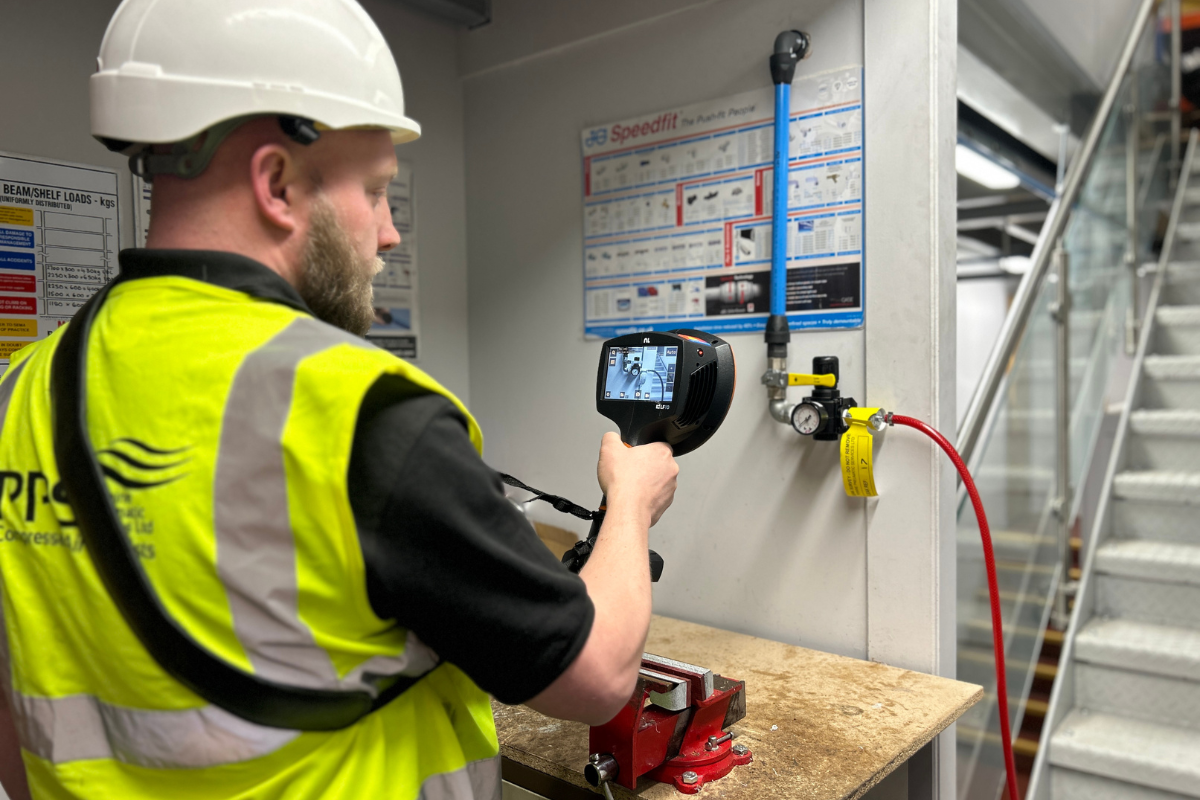Compressed air is often referred to as the ‘fourth utility’ in industrial settings. It powers tools, machinery, and critical processes across a range of sectors, from manufacturing to recycling to waste water treatment. But unlike water, gas, or electricity, compressed air systems are prone to one costly issue that often goes unnoticed: leaks.
Why leak detection matters
Even a small leak can lead to significant energy waste. In fact, air leaks can account for up to 30% of a system’s total compressed air usage, costing businesses thousands each year in unnecessary energy bills. Not only does this result in higher operating costs, but it also puts increased strain on equipment, reduces productivity, and can even create health and safety issues in the workplace.
Unfortunately, because compressed air is invisible, many leaks go undetected until they become serious problems. That’s where a compressed air leak detection survey comes in.
What should you do to prevent this?
If you’re noticing unexplained energy use or a drop in system pressure, it could be down to hidden air leaks. A professional leak detection survey can help identify exactly where the problems are, giving you a clearer picture of what’s going on inside your system.
The survey provides a detailed report that will include:
- Where each leak is located
- How much air is being lost
- What the potential cost and energy savings could be if repairs are made
Having this information allows you to make informed decisions about maintenance and energy use. Fixing leaks not only helps to lower running costs, but also improves system performance, reduces unnecessary strain on equipment, and supports wider sustainability goals.
Learn more about PPS leak detection services here.
Real results from real customers
Carpet Manufacturer Saves Over £36,000 Annually
A carpet manufacturer in the North of England contacted PPS when they began investigating high energy usage across the business. Their compressed air system, essential for the carpet weaving process, was a key area of concern. Not only could they hear air leaks, but the noise levels were becoming a health and safety risk.
PPS engineers carried out a full leak detection survey, identifying 40 separate leaks—including one registering at a loud 89 dB. Over two days, our team fixed all the leaks in the system.
The results:
- £36,000+ saved per year on compressed air energy bills
- A safer working environment due to reduced noise
- Improved system reliability and performance
- A noticeable reduction in wasted air and energy
- A lower carbon footprint, supporting their sustainability goals
Plastic Recycling Firm Cuts Energy Waste in Half
In the plastics industry, compressed air is essential, and energy costs can be high. A plastic recycling company with ambitious carbon reduction targets asked PPS to assess their compressed air usage.
Using ultrasonic leak detection, our engineer found 16 leaks across the system. The customer was given a full report outlining the energy loss and potential savings. Following the survey, PPS supplied all the required parts and fixed all the leaks for the customer.
The results:
- £15,350 annual savings based on a 12p/kWh rate
- An estimated leakage rate of 74 CFM eliminated from a system running a 150 CFM compressor, freeing up valuable capacity
- Enhanced system safety and reliability
- A reduction in carbon emissions, helping the customer stay on track with environmental targets
Start saving today
These success stories show how effective leak detection can be. Whether you’re a small business or a large manufacturer, tackling air leaks can have a significant impact on your bottom line.
If you’re hearing hissing sounds, noticing pressure drops, or simply want to check your system’s efficiency, it’s time to book a compressed air leak detection survey.
Get in touch with our team today to find out how PPS can help fix your air leaks, reduce your energy costs and improve your system performance.

